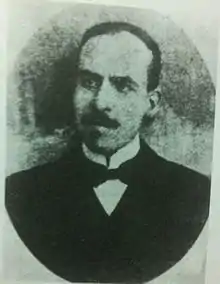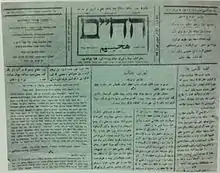

Shmuel Hayyim (HE: שמואל חיים) (born 1891 - died 1931), also known as Shmuel Eshagh Effendi or Monsieur Hayyim, was a Persian Jewish journalist, leader of the Iranian Jewish community, a Zionist, and a member of the Majlis (Iranian Parliament).
Biography
Hayyim was born in Kermanshah. He studied in the Alliance Israelite Universelle schools in Kermanshah and learned foreign languages. He was employed in the customs office in 1914 and made good connections with the British embassy in Iran. He came to Tehran in 1920 and started working as a Journalist. He founded Ha-Hayyim, a newspaper geared toward Iranian Jews and published between 1922 and 1925. The majority of the articles published in Ha-Hayyim were in Persian, but also included some Hebrew articles.
Hayyim used the political power of his newspaper to encourage Jewish Iranians to pursue more equal political rights. He wrote articles considered by some to be inflammatory for criticizing the Iranian government for not giving Jews enough protection, and for failing to abolish religious and persecutory laws against Jews. In one case in which a Jewish Iranian citizen was publicly beaten by the police for the perceived (and unproven) crime of stealing, Hayyim contacted the League of Nations to bring attention to the persecution of Iranian Jewry by their own government. This incident drew Reza Shah's attention to police conduct; the subsequent negative attention this incident brought Iran on the international stage caused Reza Shah to publicly punish the police officer who carried out the beating, thus creating an enemy against Hayyim in the police force. This, along with Hayyim's use of his newspaper to spread Zionism among Iranian Jews, further created enemies for him inside and outside of the government, and ostensibly sealed his fate after his arrest.
He became a candidate for the majles (Iranian parliament) in 1923 and won with a landslide victory. However, Reza Khan, likely misinformed by Hayyim's political opponents, felt threatened by what he perceived as Hayyim's political ambitions, and had him arrested before the sixth parliamentary elections. Hayyim's arrest led to his losing the election to Ayoub Loghman Nehourai. Hayyim was later falsely charged with conspiracy to murder the Shah and attempting to overthrow the monarchy in favor of a republic - charges that were never substantiated, and later proven to have been instigated as rumors by his political rivals. He was tried in a military tribunal and condemned to death. After being held in prison for six years, he was abruptly executed by firing squad in 1931.[1][2]
References
Further reading
- Rahimiyan, Orly R. (2010). "Haïm, Shemu'el". In Norman A. Stillman (ed.). Encyclopedia of Jews in the Islamic World. Brill Online.